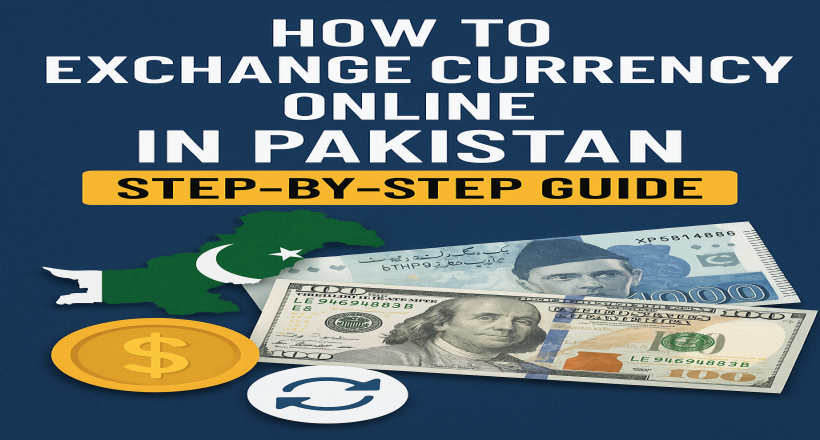We are using a merchant for PayPal and Stripe so in order to buy from their gateway you have to buy a minimum of 100 PKR equivalent.

Let’s be real—nobody wants to waste time in long lines at currency exchange shops anymore. Whether you’re a freelancer, a business owner, or just someone receiving money from abroad, online currency exchange is the way to go in Pakistan. It’s fast, secure, and gives you access to the best exchange rates—all from your phone or computer.
Online currency exchange allows you to convert foreign currency (like USD, EUR, or even crypto) into Pakistani Rupees (PKR) through a digital platform. These platforms act as middlemen who make the process smooth, fast, and most importantly—safe.
You pick a platform → Choose the currency → Send your money → They convert it → You get your PKR (or vice versa). It’s like ordering food online, but instead of biryani, you get money!
Yes, as long as you use platforms approved by relevant financial authorities and avoid black market exchanges.
SBP regulates foreign exchange activities through its licensed money exchangers. Many online platforms work with these authorized dealers to stay compliant.
One of the most popular and trusted platforms. Supports a wide range of e-wallets and crypto exchanges.
Great for freelancers. Supports Payoneer, Skrill, Neteller, and even Perfect Money.
Good for instant exchanges, especially between Skrill, Payeer, and JazzCash.
If you’re into crypto, LocalBitcoins lets you trade BTC with PKR using local payment methods.
Pick a platform with solid reviews, verified status, and secure payment options.
Provide your CNIC, email, and sometimes a selfie with your ID. This keeps things legit.
Choose from USD, GBP, EUR, AED, or crypto like BTC and USDT.
Specify how much you want to exchange and where to receive the funds (e.g., JazzCash, bank account).
Send the foreign currency using the platform’s provided account or wallet address.
Once payment is confirmed, you’ll receive PKR within minutes to hours, depending on the method.
The most common and in-demand.
Popular among Pakistanis working abroad.
Crypto is booming in Pakistan, and many platforms now support these exchanges.
Reliable but slightly slower.
Perfect for quick mobile transfers.
Great for freelancers and digital nomads.
Always use HTTPS sites
Don’t share login info
Use 2FA (Two-Factor Authentication)
If it sounds too good to be true, it probably is. Avoid platforms with no reviews or social proof.
Online platforms often offer more competitive rates than physical exchange offices.
No need to leave home. Most exchanges complete in minutes.
You get digital receipts, real-time rate visibility, and tracking.
Especially on first-time exchanges, your documents may take time to verify.
Depending on method, delays of 30 mins to a few hours may occur.
Currency rates can change fast, especially for crypto. Lock in rates if the platform allows.
Don’t just go with the first platform you see. Compare rates on 2-3 sites.
Make sure the site has an SSL certificate and is regulated.
If anything goes wrong, you’ll need these for support.
Exchanging currency online in Pakistan has never been easier. Whether you’re dealing in dollars, euros, or crypto, digital platforms offer a safe, fast, and efficient way to convert money. Just follow the step-by-step guide, pick the right platform, and enjoy hassle-free transactions. Always prioritize safety, compare rates, and stay up to date with SBP regulations to make the most out of your exchanges.
1. Is online currency exchange safe in Pakistan?
Yes, as long as you use a verified and secure platform with good user reviews.
2. How long does a typical online exchange take?
Anywhere from 5 minutes to a few hours, depending on the platform and payment method.
3. Can I convert crypto to PKR legally?
While crypto isn’t officially regulated, peer-to-peer platforms like LocalBitcoins are widely used.
4. Do I need a bank account to exchange currency online?
Not always. Many platforms support JazzCash, Easypaisa, and other mobile wallets.
5. What documents are required for registration?
Usually CNIC, email, and sometimes a selfie for verification.